Friday, 29 January 2016
Monday, 25 January 2016
Monday, 18 January 2016
Parenting not schools has the biggest impact on student outcomes, so why are teachers blamed for results?
By Thomas Rogers

And what we should do about it? One former history teacher looks at a very real difficulty faced by schools every day
The most significant challenge that every school in this country now faces is to bridge the educational attainment gap between the “haves” and “the have nots”; to ensure the achievement of disadvantaged students equals or even exceeds that of their more affluent peers. The government has made this one of its top priorities, throwing a large part of the education budget at it.
But the gap isn’t narrowing.
So, have they got it wrong? Not in the sense of trying to bridge that gap, which has always been a central aspiration of the vast majority of teachers, but on what poverty actually is today in the UK and how to deal with its influence on educational outcomes?
As our society has become more and more materialistic, our definition of poverty has become more and more narrow in its parameters, focusing solely on the financial standing of families and individuals. The problem is, I think, that the most significant "poverty" in the UK today is emotional poverty, mind-set poverty, aspiration poverty, in essence; “values poverty”. And this is a form of poverty that finance seems unable to fix.
If you want to visit a more “value-rich” nation, I can recommend Tanzania. The people there live with a level of poverty unbeknown to the vast majority of the UK population. However, dig a little deeper and find out how the young people in that country see the world, experience relationships or spend their time; as a collective, they are infinitely happier than ours, which is pretty astonishing. They are “values rich”. With that in mind, do we need to widen the definition of poverty in this country to include not only children whose parents are on a low income but also, and perhaps even more significantly, those who are disadvantaged in other ways?
Imagine, for a second, that we gave equal standing to “values poverty” and “financial poverty”. Child A is above the financial poverty threshold. However, his parents simply don’t “parent” and even when they do, any kind of emotional intimacy or social connection is limited to a shout up the stairs to stop playing the PlayStation because its 1am. The child lacks any kind of cornerstone in their life, feels alone, struggles to communicate effectively and is desperate for love and attention. However, they do have an iPhone 6.
On the government’s current measure, they will be placed into the giant chasm of “OK”. Meanwhile, nearby, Child B has two parents who are both on welfare but offer him or her the spiritual, emotional and physical love that he or she needs as well as instilling the kind of values they would like their son or daughter to have. They excel at school and are comfortable in their own skin. Above all, Child B has the aspiration to do well, to lift them and their family out of the financial situation they are in. I would argue that both of these children areequally disadvantaged, but in completely different ways. Child A is “value poor” whereas Child B is “value rich”.
Why am I calling for this broadening of the definition of poverty? Because, I am sure, without addressing this so called “values poverty”, we have no chance of dealing with poverty in its more literal sense.
One component of any strategy to eliminate it must be the one component that has been missing for so many years; parental and student accountability. At the moment, responsibility for student performance seems to rest solely at the school gates. This is despite the fact that it’s well established that parents are the biggest stakeholders in their own children’s success or failure. The government’s response has been to offer parenting classes, extend school opening hours and ring-fence school budgets. Schools have responded by offering more and more after-school revision sessions and instigating a constant stream of worthy interventions. The support that is currently being offered to parents and students across this land is unrivalled in the history of education.
Yet, if parents and students don’t engage with that support, if they don’t take responsibility and embrace the help they are provided with, and if the student ultimately fails in their education, then schools are put in special measures, heads are sacked and teachers are denied pay rises.
All on the presumption that the educators are to blame. The view being pushed by the media and government that schools are simply service providers gives the ammunition for those same parents and students to shout from the hilltops that the service “wasn’t good enough” and the “system failed”. To change this, let me suggest a system whereby if parents and students are known to have opted out of education, they will still receive the same support, intervention and time as the next person. Of course they would. However, their “opt out” would also mean that schools could opt out of including their exam performance data in their own reports to Ofted and government. Fair is fair in the redistribution of accountability. If our young people are to become “value rich”, then the value of personal responsibility has to become a truly British value once again.
If parents and students, regardless of where they sit on the income scale, are held accountable in the same way as schools and teachers, then suddenly that equality of educational outcome that our whole society craves may become a reality.
Tom Rogers tweets as @RogersHistory and runs rogershistory.com
Friday, 15 January 2016
How to use search like a pro: 10 tips and tricks for Google and beyond
Search engines are pretty good at finding what you’re looking for these days, but sometimes they still come up short. For those occasions there are a few little known tricks which come in handy.
So here are some tips for better googling (as it’s the most popular search engine) but many will work on other search engines too.
1. Exact phrase
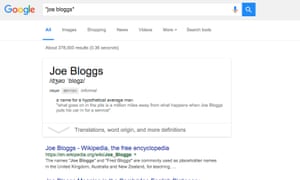
The simplest and most effective way to search for something specific is to use quote marks around a phrase or name to search for those exact words in that exact order.
For instance, searching for Joe Bloggs will show results with both Joe and Bloggs but not necessarily placed sequentially. Searching for “Joe Bloggs” will surface only those that specifically have the name Joe Bloggs somewhere on the page.
The exact or explicit phrase search is very useful for excluding more common but less relevant results.
2. Exclude terms
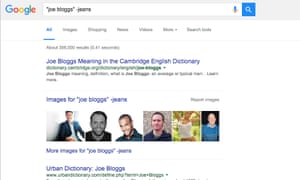
If exact phrase doesn’t get you what you need, you can specifically exclude certain words using the minus symbol.
A search for “Joe Bloggs” -jeans will find results for Joe Bloggs, but it will exclude those results for the Joe Bloggs brand of jeans.
3. Either OR
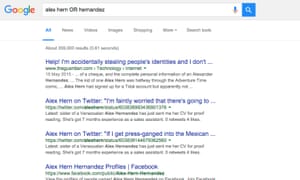
Default text searches find results with all the words of the query. By using the OR term you can search for one or another term, not just all the terms. OR searches can be useful for finding things that you’re not sure which term will be used from a known list.
4. Synonym search
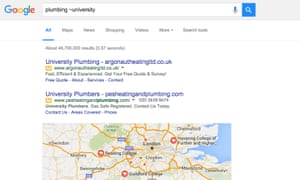
Sometimes it’s useful to search for a less specific term. If you’re not sure which term will be used you can use synonym search.
Searching for plumbing ~university will bring up results for plumbing from colleges as well as universities, for example.
5. Search within a site
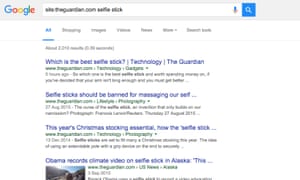
The search engines of most websites are poor. You can search using Googleinstead by using the site or domain limiter.
Searching with site:theguardian.com followed by a search term, will find results from only theguardian.com. Combining with explicit search terms makes it even more powerful.
6. The power of the asterisk
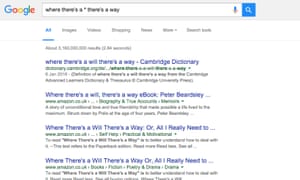
Like the blank tile in Scrabble, the asterisk works as a wild card within searches. It can be used in place of a missing word or part of a word, which is useful for completing phrases, but also when you’re trying to search for a less definite article.
A search for architect* will search for architect, but also architectural, architecture, architected, architecting and any other word which starts with architect.
7. Searching between two values
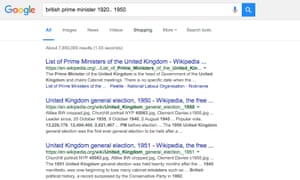
Searching for something with a qualifier between two ranges is a good way of answering questions. For instance, if you’re looking for the who were the British prime ministers between 1920 and 1950 a search using british prime minister 1920.. 1950 will bring up results with dates ranging between 1920 and 1950.
That’s your search term followed by two full stops and a space.
8. Search for word in the body, title or URL of a page
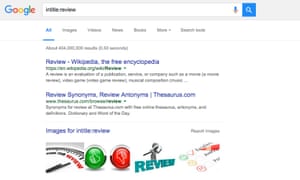
Sometimes you only want to find text either within the URL, body or title of a page. Using the qualifier inurl: will search just within the url. The qualifier intext:will search within the body, while intitle: will search only within a page title.
For example, intitle:review will bring up all the articles with “review” in the page title.
9. Search for related sites
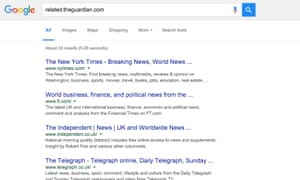
The related qualifier is useful for finding similar sites. Searching forrelated:theguardian.com for instance, will bring up the websites of other news organisations that Google deems the most similar to the Guardian.
10. Combine them
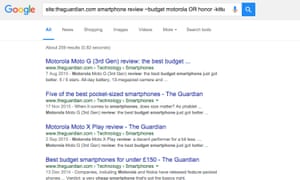
All these search tools can be combined to narrow down or expand searches. While some of them may be used only rarely, some such as explicit phrase searches are useful in almost all cases.
As Google and other search engines improve their understanding of the way people naturally type or say search queries, these power tools will likely become less and less useful – at least that’s the goal that search engines are working towards – but that’s certainly not the case at the moment.
Subscribe to:
Posts (Atom)
